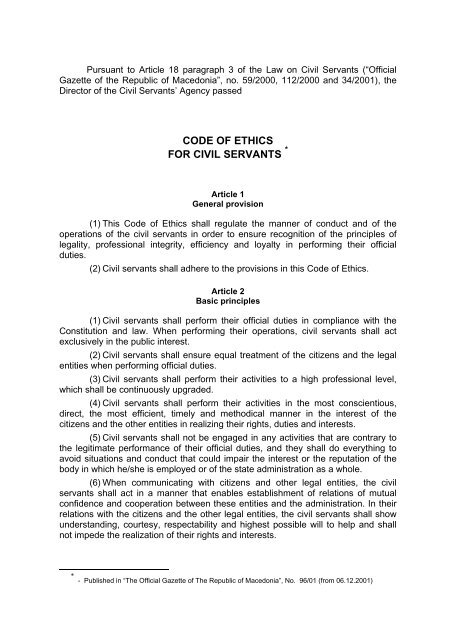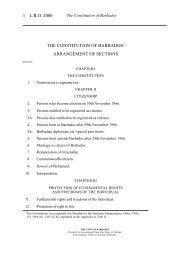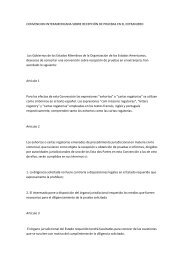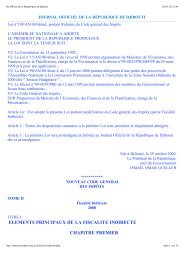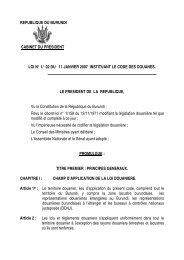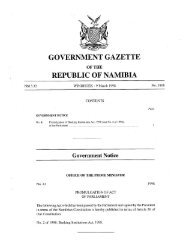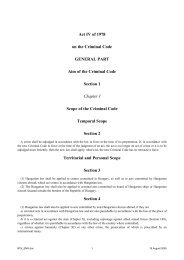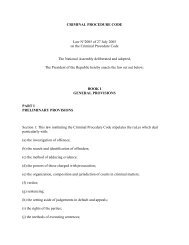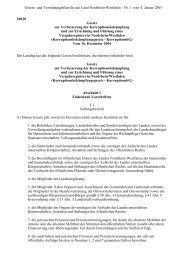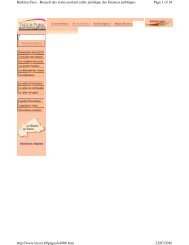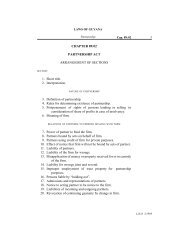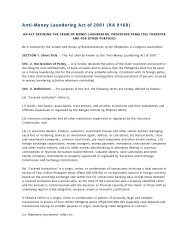Code of Ethics for Civil Servants - On TRACK against Corruption
Code of Ethics for Civil Servants - On TRACK against Corruption
Code of Ethics for Civil Servants - On TRACK against Corruption
You also want an ePaper? Increase the reach of your titles
YUMPU automatically turns print PDFs into web optimized ePapers that Google loves.
Article 6In<strong>for</strong>mation transparency(1) <strong>Civil</strong> servants shall treat the in<strong>for</strong>mation they acquired due to theirposition in the state administration with the all necessary secrecy and shall provideappropriate in<strong>for</strong>mation protection.(2) <strong>Civil</strong> servants shall facilitate the access <strong>of</strong> citizens to the in<strong>for</strong>mation theyhave the right to obtain <strong>for</strong> the purpose <strong>of</strong> realization <strong>of</strong> their rights and interests.(3) <strong>Civil</strong> servants shall not refuse to provide and shall not provide incorrectdata or in<strong>for</strong>mation to the state bodies, the legal entities and citizens, should theprovision <strong>of</strong> data be stipulated by law.Article 7Political activity(1) <strong>Civil</strong> servants shall per<strong>for</strong>m their <strong>of</strong>ficial duties and the determined policy<strong>of</strong> the body in which they are employed on politically neutral manner i.e. correctlyand efficiently, without revising their political correctness.(2) <strong>Civil</strong> servants shall not represent or express their political view inper<strong>for</strong>ming the <strong>of</strong>ficial duties.(3) <strong>Civil</strong> servants shall not carry out political activities that could underminethe confidence <strong>of</strong> the citizens in his/her ability to per<strong>for</strong>m the <strong>of</strong>ficial duties in aproper manner.(4) <strong>Civil</strong> servants, in their relations with citizens and the legal entities as wellas in their relations with the other civil servants, shall not mention, emphasis norindirectly state their membership in specific political party.(5) <strong>Civil</strong> servants shall not oblige other civil servants or persons without thestatus <strong>of</strong> civil servants in the body in which they are employed to join specificpolitical party nor shall they instigate them to act so by promising them careerpromotion.Article 8Conflict <strong>of</strong> financial interests(1) <strong>Civil</strong> servants shall not let their personal financial interest to be in conflictwith their position and the status <strong>of</strong> civil servant.(2) Financial interest shall include any benefit <strong>for</strong> the civil servant, <strong>for</strong> his/herfamily, relatives, friends, <strong>for</strong> physical persons and legal entities with whom he/shehas or had business relations.(3) <strong>Civil</strong> servants shall not accept relations <strong>of</strong> cooperation with persons ororganizations that have or had economic interest from the decisions or the activities<strong>of</strong> the body in which the civil servant is employed in the past three years.
Article 9Gifts and other <strong>for</strong>m <strong>of</strong> benefit(1) <strong>Civil</strong> servants shall not ask <strong>for</strong> nor accept, <strong>for</strong> themselves or <strong>for</strong> others,gifts, services, assistance or any other benefit that could affect or that could seemto affect their decisions <strong>for</strong> certain issues, or that could corrupt their pr<strong>of</strong>essionalapproach towards certain issues.(2) <strong>Civil</strong> servants shall not accept gifts or gratitude that could be deemed asreward <strong>for</strong> those activities the per<strong>for</strong>mance <strong>of</strong> which is their responsibility.(3) <strong>Civil</strong> servants shall not ask <strong>for</strong> themselves or <strong>for</strong> other nor shall theyaccept gifts or other <strong>for</strong>m <strong>of</strong> benefit from other civil servant or his/her relative.Article 10Protection and economy usage <strong>of</strong> government funds(1) <strong>Civil</strong> servants shall put all ef<strong>for</strong>ts to ensure maximum effective andeconomy management and usage <strong>of</strong> tangible assets, equipment and other objectsentrusted to them, and shall prevent their illegal disposal.(2) <strong>Civil</strong> servants shall take care <strong>of</strong> undertaking appropriate measures toensure security <strong>of</strong> entrusted objects as well as <strong>of</strong> eliminating the possibilities tocause material damage in the body in which they are employed.Article 11Conduct at the service(1) <strong>Civil</strong> servants, except due to justified causes, shall not postpone orentrust the per<strong>for</strong>mance <strong>of</strong> the activities or the decision making within theirresponsibility to other civil servants. They shall not refuse the per<strong>for</strong>mance <strong>of</strong> the<strong>of</strong>ficial duties <strong>of</strong> the working post assigned to them nor shall reject the orders by thedirect superior civil servant, except in the cases stipulated by law.(2) Respecting <strong>of</strong>fice hours, civil servants shall pay special ef<strong>for</strong>ts and timeto per<strong>for</strong>m the <strong>of</strong>ficial duties. They shall limit absence from their working post tothat strictly indispensable.(3) <strong>Civil</strong> servants shall not use the objects or the equipment at their disposalassigned to them <strong>for</strong> <strong>of</strong>ficial purposes <strong>for</strong> private ones. Except in cases <strong>of</strong>emergency, they shall not use the <strong>of</strong>fice telephone or computer equipment <strong>for</strong>personal needs. <strong>Civil</strong> servants having company vehicle at disposal shall use thevehicle <strong>for</strong> per<strong>for</strong>ming <strong>of</strong>ficial duties and shall not transport persons not within theadministration.(4) <strong>Civil</strong> servants shall conduct correctly towards the other civil servants aswell as the employees in the other state bodies.(5) <strong>Civil</strong> servants shall pay special attention to the way they dress in ordernot to cause an impression <strong>of</strong> indecency or impairment <strong>of</strong> the reputation <strong>of</strong> thebody in which he/she is employed.
Article 12Conduct in private life(1) <strong>Civil</strong> servants shall avoid activities and conduct in their private life thatcould diminish the confidence <strong>of</strong> the public in state administration. They shouldavoid actions or activities that are in conflict with the legal or ethical norms and thatcould be a reason <strong>for</strong> their personal blackmail related to the per<strong>for</strong>mance <strong>of</strong> the<strong>of</strong>ficial duties.(2) <strong>Civil</strong> servants shall avoid situation in which, due to their position in thestate administration, they are obliged to per<strong>for</strong>m operations in favour <strong>of</strong> any personor in which they are subject to inappropriate influence by other persons.Article 13Public relations(1) <strong>Civil</strong> servants in direct contact with the citizens and the legal entitiesshall pay appropriate attention to each <strong>of</strong> their issues and shall provideexplanations requested from them pertaining to their conduct and the conduct <strong>of</strong>the other employees in the body.(2) When reaching decision about the cases, civil servants shall respecttheir chronological order and shall not refuse to undertake actions within theirresponsibility by indicating reasons such as the scope <strong>of</strong> work to be accomplishedor the lack <strong>of</strong> time.(3) Without influencing their right to publicly express their opinion, civilservants shall refrain from giving public statements that impair the reputation <strong>of</strong> thebody in which they are employed or <strong>of</strong> the state administration as a whole.(4) <strong>Civil</strong> servants shall not assume obligations or make promises pertainingto their decisions or actions or the decisions and the actions <strong>of</strong> the other civilservants or the <strong>of</strong>ficial managing the body in which the civil servant is employed,should it cause or should it confirm the mistrust in the administration or in itsindependence and impartiality.(5) <strong>Civil</strong> servants shall, when preparing written materials and in any othercommunication, use clear and understandable language.Article 14Final provisionThis <strong>Code</strong> <strong>of</strong> <strong>Ethics</strong> shall enter into <strong>for</strong>ce on the eight day following the dayit is published in the “Official Gazette <strong>of</strong> the Republic <strong>of</strong> Macedonia”.No. 08-1712CIVIL SERVANTS AGENCY21 st November 2001 Director,SkopjeRubin DVOJAKOV, p.s.


